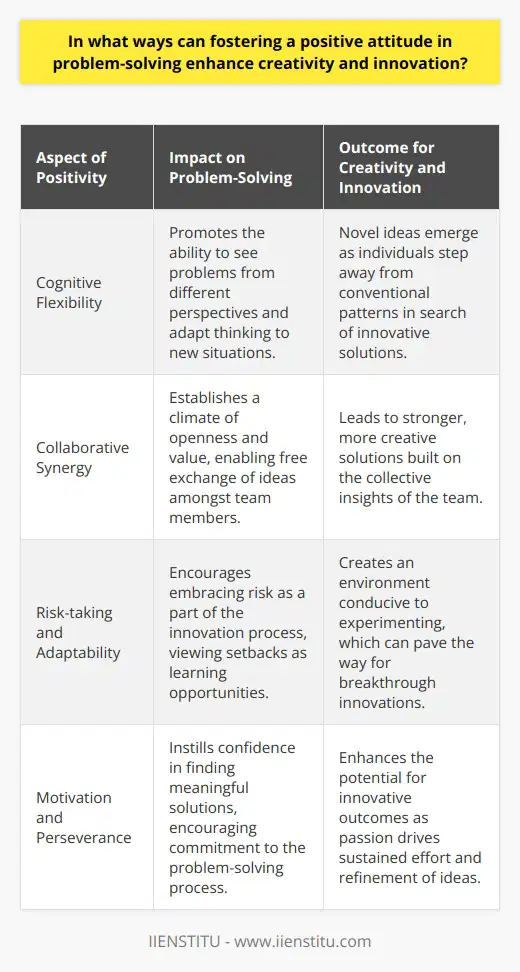
Introduction
Introduction
Positive Attitude
Benefits of a Positive Attitude
Examples
Conclusion
There's an old saying my grandmother used to share whenever I felt stuck: "Every problem contains within it the seeds of its own solution." Back then, I didn't quite grasp the depth of her words. But as I've navigated through life's twists and turns—from the challenges of academia to the complexities of the workplace—I've come to realize just how powerful a positive attitude can be in unlocking effective problem-solving skills.
Problem-solving isn't just a technical ability; it's an essential life skill that impacts every facet of our existence. Whether we're dealing with a tricky mathematical equation, navigating interpersonal conflicts, or trying to optimize supply chain management process tips in our businesses, the way we approach problems can make all the difference. Those who excel at problem-solving often have one thing in common: a positive mindset that propels them forward, even when the going gets tough.
In this article, let's embark on a journey to explore the myriad benefits of maintaining a positive attitude in problem-solving. We'll delve into personal stories, draw from academic insights, and perhaps even uncover some practical tips that you can apply in your own life.
The Power of a Positive Attitude in Problem-Solving
I remember vividly the time when I was leading a project that seemed destined for failure. The deadlines were tight, resources scarce, and the team's morale was at an all-time low. It was during this period that I stumbled upon Carol S. Dweck's concept of the growth mindset in her book "Mindset: The New Psychology of Success" (Dweck, 2006). The idea that abilities can be developed through dedication and hard work resonated with me deeply.
Adopting a positive attitude transformed not just my approach but also the team's dynamics. We began to see obstacles as opportunities, and slowly but surely, solutions started to emerge. This experience reinforced the belief that optimism isn't just a feel-good emotion but a strategic asset in problem-solving.
Benefits of a Positive Attitude
1- Enhanced Creativity and Innovation
A positive mindset opens the door to creativity. When we're not bogged down by negative thoughts, our minds are free to explore unconventional solutions. According to Barbara L. Fredrickson's Broaden-and-Build Theory (Fredrickson, 2001), positive emotions expand our awareness and encourage novel ideas.
2- Resilience in the Face of Challenges
Problems often come with their fair share of setbacks. A positive attitude fosters resilience, allowing us to bounce back from failures. As Angela Duckworth discusses in her book "Grit: The Power of Passion and Perseverance" (Duckworth, 2016), it's the relentless pursuit fueled by optimism that leads to success.
3- Improved Decision-Making
Optimism can enhance our ability to make sound decisions. By focusing on potential solutions rather than dwelling on problems, we can weigh options more effectively. This approach is crucial, especially when trying to develop strategies to improve problem-solving skills.
TRIZ: Exploring the Revolutionary Theory of Inventive Problem Solving
Exploratory Data Analysis: Unraveling its Impact on Decision Making
Failure Tree Analysis: Effective Approach for Risk Assessment
4- Better Collaboration and Team Dynamics
Positivity is contagious. In team settings, a positive attitude can boost morale, encourage open communication, and foster a collaborative environment. This synergy often leads to more efficient and effective problem resolution.
A positive attitude is critical to unlocking problem-solving skills.
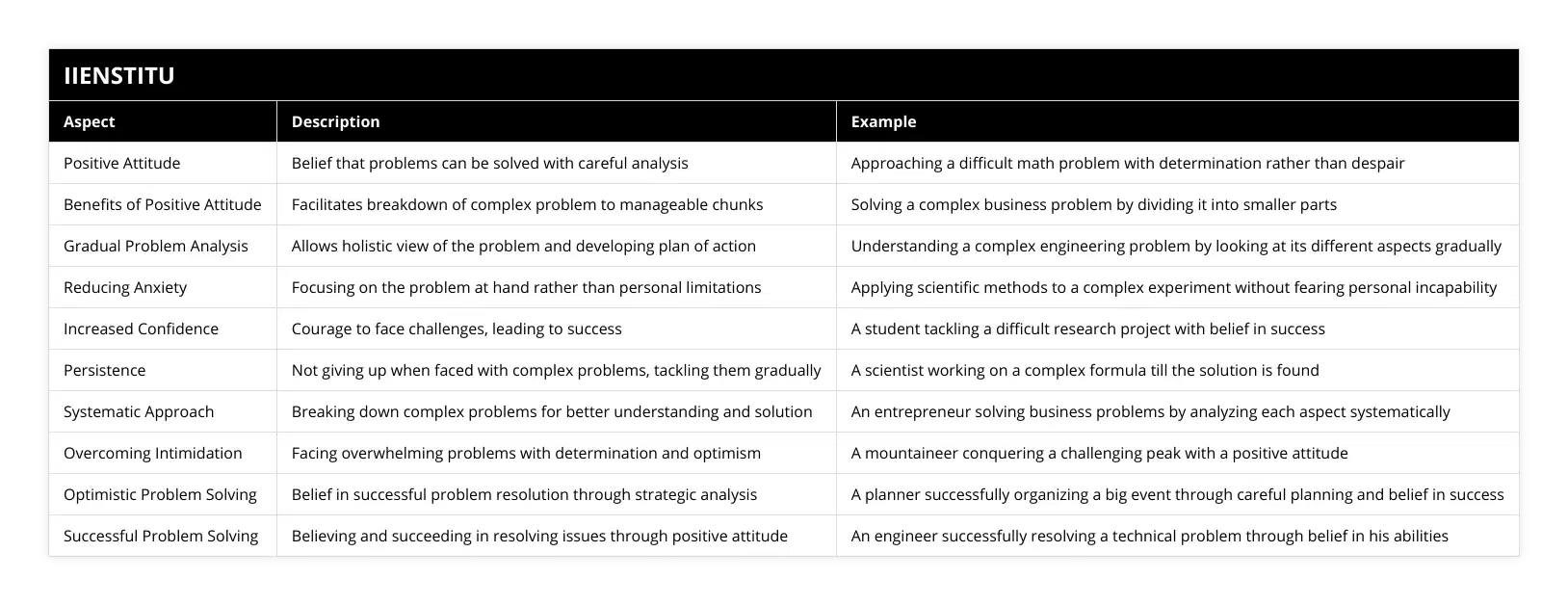
5- Reduced Stress and Anxiety
Approaching problems with optimism can alleviate stress. When we believe that solutions are attainable, we're less likely to feel overwhelmed, which in turn can enhance our performance.
Personal Stories and Examples
Overcoming Academic Hurdles
During my university days, I struggled with a particularly challenging course in quantum mechanics. The concepts were abstract, and no matter how much I studied, the solutions seemed elusive. Frustration began to set in, and I contemplated dropping the course. However, a mentor introduced me to "The Power of Positive Thinking" by Norman Vincent Peale (Peale, 1952). Inspired, I shifted my perspective.
Instead of seeing the material as an insurmountable wall, I started to view it as a puzzle waiting to be solved. I formed study groups, sought help when needed, and celebrated small victories along the way. By the end of the semester, not only did I pass the course, but I developed a genuine appreciation for the subject.
Business Challenges and Optimism
In the professional realm, I once worked with a startup aiming to optimize supply chain management processes. The task was daunting—logistical inefficiencies were causing delays and escalating costs. The initial atmosphere was grim, with many doubting whether improvement was possible.
Drawing from strategies to develop a constructive approach to problems, we decided to reframe our mindset. We conducted brainstorming sessions, encouraged out-of-the-box thinking, and remained steadfast in our belief that a solution existed. Eventually, we implemented innovative tracking technologies and revamped our logistics strategy, leading to a 30% reduction in delivery times and significant cost savings.
Tips for Developing a Positive Attitude in Problem-Solving
Developing a positive attitude isn't always intuitive, especially when faced with persistent challenges. Here are some practical steps to cultivate optimism:
Practice Gratitude
Regularly acknowledging what you're thankful for can shift your focus from problems to possibilities.
Embrace Failure as a Learning Opportunity
Recognize that setbacks are a natural part of the problem-solving process and offer valuable lessons.
Surround Yourself with Positive Influences
Engage with individuals who uplift and inspire you. Their attitudes can be infectious.
Set Realistic Goals
Break down large problems into smaller, manageable tasks. Celebrate small wins to build momentum.
Maintain a Solution-Oriented Mindset
Focus your energy on what can be done rather than what's going wrong.
The Role of Positive Attitude in Specific Contexts
Academic Success
A positive attitude can significantly impact academic performance. Students who believe in their ability to overcome academic challenges are more likely to persist and seek resources that aid their learning. According to a study published in the Journal of Educational Psychology (Bandura, 1997), self-efficacy beliefs play a crucial role in students' motivation and achievement.
Professional Growth
In the workplace, a positive mindset can lead to better professional growth and opportunities. Employers often value individuals who approach challenges proactively and with enthusiasm. This attitude can lead to leadership roles and the ability to influence organizational change.
Optimizing Supply Chain Management Processes
When dealing with complex systems like supply chains, a positive attitude is essential. Problems in supply chain management can be intricate and multifaceted. By maintaining optimism, professionals can more effectively collaborate, innovate, and implement tips to optimize supply chain management processes, ultimately enhancing efficiency and productivity.
Implementing a Positive Attitude: A Step-by-Step Guide
Developing a positive attitude is a journey. Here's a step-by-step approach to help you along the way:
1- Self-Reflection
Assess your current mindset.
Identify any negative thought patterns.
2- Set Intentions
Decide to adopt a positive attitude.
Write down affirmations or guiding principles.
3- Educate Yourself
Read literature on positive psychology.
Learn from experts and thought leaders.
4- Practice Mindfulness
Engage in activities like meditation or journaling.
Stay present and aware of your thoughts.
5- Seek Feedback
Ask trusted peers for constructive feedback.
Use their insights to grow and adapt.
6- Stay Persistent
Remember that change takes time.
Celebrate progress, no matter how small.
Conclusion
Life is replete with challenges, both big and small. Yet, it's not the absence of problems that defines our success, but rather our approach to overcoming them. A positive attitude isn't just about feeling good; it's a strategic tool that empowers us to navigate obstacles effectively, unlock our problem-solving potential, and achieve our goals.
Whether you're a student grappling with complex theories, a professional aiming to optimize supply chain management processes, or simply someone facing everyday hurdles, embracing optimism can be transformative. By focusing on possibilities rather than limitations, we open ourselves up to innovative solutions and pathways that might have otherwise remained hidden.
In the words of Viktor E. Frankl in his seminal work "Man's Search for Meaning" (Frankl, 1959), "When we are no longer able to change a situation, we are challenged to change ourselves." Adopting a positive attitude is perhaps one of the most profound changes we can make—a change that not only enhances our problem-solving abilities but also enriches our lives in innumerable ways.
A positive attitude is indeed critical to unlocking problem-solving skills.
References
Bandura, A. (1997). Self-Efficacy: The Exercise of Control. W.H. Freeman and Company.
Duckworth, A. (2016). Grit: The Power of Passion and Perseverance. Scribner.
Dweck, C. S. (2006). Mindset: The New Psychology of Success. Random House.
Fredrickson, B. L. (2001). The Role of Positive Emotions in Positive Psychology: The Broaden-and-Build Theory of Positive Emotions. American Psychologist, 56(3), 218–226.
Frankl, V. E. (1959). Man's Search for Meaning. Beacon Press.
Peale, N. V. (1952). The Power of Positive Thinking. Prentice Hall.
Frequently Asked Questions
What is the definition of problem solving?
Problem-solving is a critical cognitive process involving identifying and resolving issues or obstacles. It requires the individual to analyze a problem, determine potential solutions, evaluate them, and then implement the most effective solution. Problem-solving can be defined as a cognitive process that allows individuals and groups to identify and address problems, develop potential solutions, and make decisions that lead to successful problem resolution.
The process of problem-solving is often broken down into five stages: defining the problem, generating possible solutions, evaluating the solutions, implementing the chosen solution, consists in and monitoring the outcome.
The first stage involves defining the problem by gathering information about the situation and breaking down the problem into manageable components.
The second stage involves generating possible solutions by brainstorming, researching, and consulting with experts.
The third stage consists in evaluating the answers and selecting the best one.
The fourth stage involves implementing the chosen solution.
The fifth stage involves monitoring the outcome to assess whether the solution was successful.
Problem-solving is a complex process, and the outcome's success depends on the individual's ability to analyze the problem, identify potential solutions, and evaluate the solutions before implementing the best solution. It requires individuals to think critically, use creativity and draw on their knowledge and experience. It also needs individuals to be flexible and open to different approaches and solutions.
Problem-solving is an essential skill that people use in their everyday lives. It is necessary for the successful functioning of society, as it enables individuals and groups to identify and address problems, develop potential solutions, and make decisions that lead to successful problem resolution.
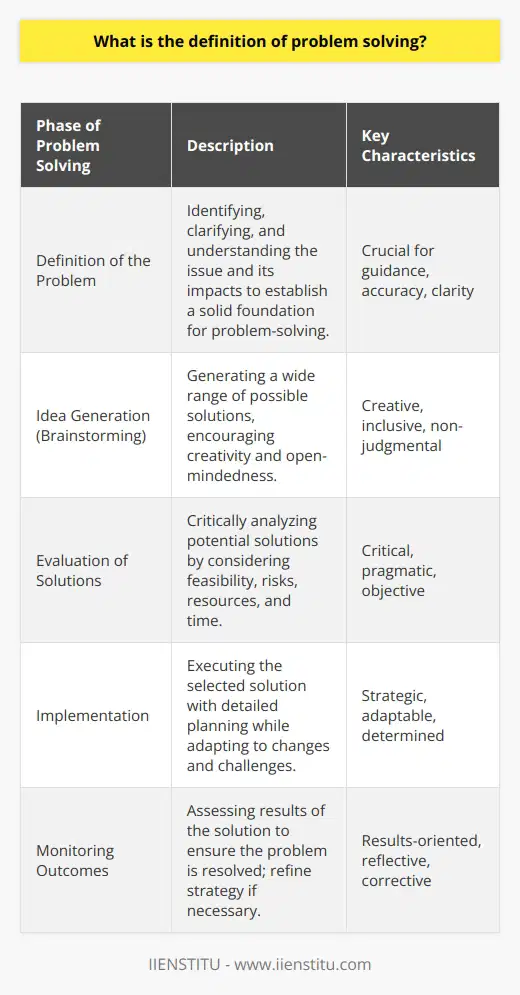
How does having a positive attitude help with problem solving?
A positive attitude when approaching a problem can be a great asset in finding a solution. It is often said that attitude is everything, and this is especially true when it comes to problem-solving. A positive attitude can lead to a more creative approach to problem-solving and increase the likelihood of finding a successful solution.
A positive attitude can help to increase motivation when approaching a problem. This can be a great asset in helping to identify the root cause of the problem and find a solution. In addition, with a positive attitude, an individual is more likely to take on the challenge of solving the problem rather than avoiding it or simply giving up.
Having a positive attitude can also help to promote constructive thinking. That is, thinking that focuses on solutions rather than playing the blame game or worrying about the consequences of failure. A positive attitude can help to keep the focus on finding solutions and staying motivated to work through the problem until a successful outcome is achieved.
In addition, having a positive attitude can help to reduce stress when tackling a problem. This can be invaluable in helping to maintain a clear mind and allow for the type of creative thinking that is often necessary when finding solutions. A positive attitude can help to keep the individual focused on the task at hand and help to prevent a feeling of being overwhelmed by the problem.
Finally, having a positive attitude can help to create a positive environment when approaching a problem. That environment encourages collaboration and brainstorming and promotes the exchange of ideas. This can be key to finding a successful solution.
In conclusion, having a positive attitude when approaching a problem can be a great asset in finding a successful solution. A positive attitude can help to increase motivation, promote constructive thinking, reduce stress, and create a positive environment when approaching a problem.
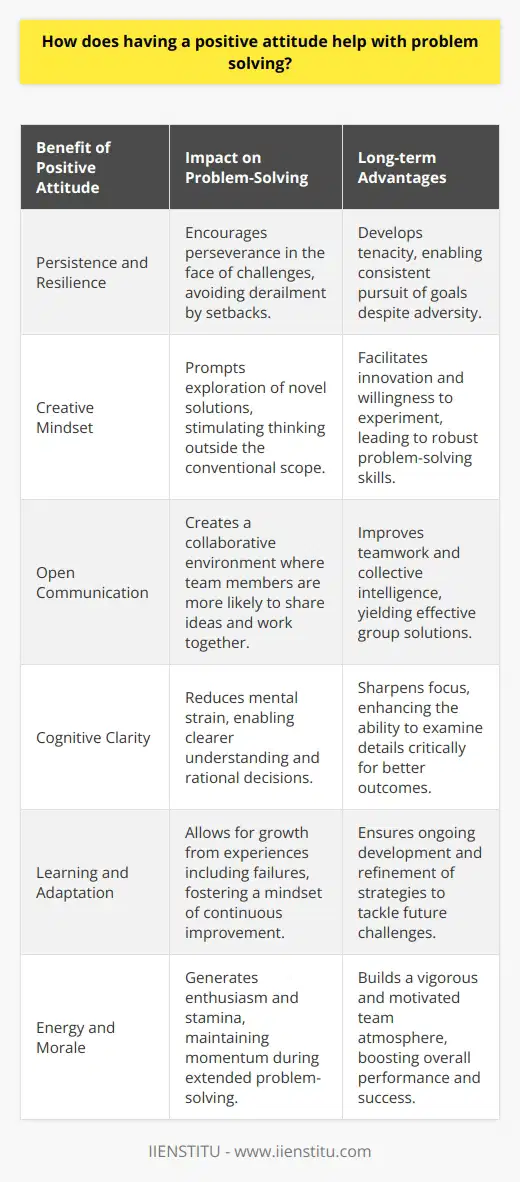
What are some examples of how a positive attitude can help with problem solving?
A positive attitude when facing a problem can be incredibly beneficial in solving it. Viewing the problem as an opportunity to learn and grow rather than a hurdle that cannot be overcome is essential. With the right attitude, problems can be solved more effectively and quickly.
One way that a positive attitude can help with problem-solving is by increasing motivation and perseverance. People with a positive attitude are likelier to persist in issue-solving and not give up when the going gets tough. With this attitude, it is more likely that a solution will be found.
Another way that a positive attitude can help with problem-solving is by providing greater clarity and focus. People with a positive attitude are more likely to take a step back and look at a situation objectively, allowing them to understand the problem better and develop a plan for solving it. This clarity and focus can also help to prevent distractions from derailing the problem-solving process.
Finally, a positive attitude can help to foster creativity and innovation. People with a positive attitude are more likely to look at a problem from a different perspective, allowing them to come up with creative solutions that would not have been considered otherwise. This creativity can be incredibly beneficial in finding a solution to a tricky problem.
In conclusion, I have a positive attitude when problem-solving can be immensely beneficial. It can increase motivation, provide clarity and focus, and foster creativity and innovation, all of which are important in finding a solution to a problem. Therefore, it is essential to maintain a positive attitude when facing a problem to maximize the chances of finding a solution.
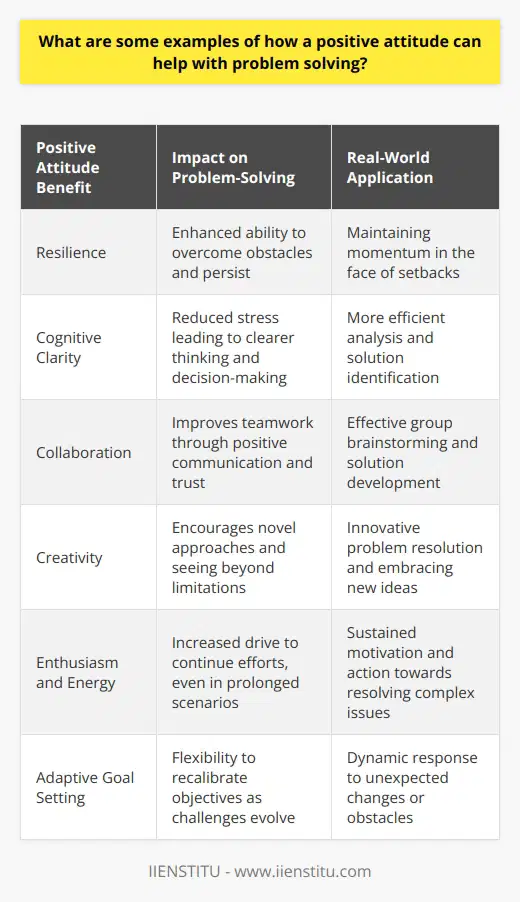
What are the key components that contribute to effective problem-solving?
Key Components of Effective Problem-Solving
Understanding the Situation
The first component of effective problem-solving is understanding the situation properly. This entails gathering comprehensive information about the problem and defining it explicitly. Accurate problem identification enables the problem-solver to establish relevant goals and objectives that are critical in devising feasible solutions.
Exploring Multiple Perspectives
Divergent thinking, or exploring multiple perspectives, is the second key component. It involves considering different viewpoints, opinions, and beliefs in order to identify various aspects of the problem. By being open-minded and considering different alternatives, a problem solver can generate multiple potential solutions, increasing the likelihood of developing an effective and creative resolution.
Critical Thinking and Analysis
The third key component is critical thinking and analysis, involving the evaluation of the problem and potential solutions. By analyzing each solution's pros and cons, the problem solver can determine the most appropriate course of action. Factoring in the feasibility, practicality, and effectiveness of each solution allows for selecting the most viable option that adheres to predetermined goals and objectives.
Decision Making and Implementation
The fourth component is decision making and implementation, which requires selecting the best solution and putting it into practice. It is crucial to consider the potential consequences and necessary resources while taking decisive action. Effective problem-solving involves continual assessment and adjustments to improve and refine the chosen solution.
Collaboration and Communication
Lastly, collaboration and communication play a significant role in problem-solving. Consulting with other individuals can offer fresh insights, ideas, and expertise, which can greatly enhance the problem-solving process. Furthermore, clear and concise communication is essential in conveying the problem, proposed solutions, and implementation strategies to all relevant stakeholders.
In conclusion, effective problem-solving is a multifaceted process that involves understanding the situation, exploring multiple perspectives, employing critical thinking and analysis, making decisions and implementing solutions, and cultivating collaboration and communication. By mastering these components, individuals and teams can successfully address various challenges and achieve their goals.
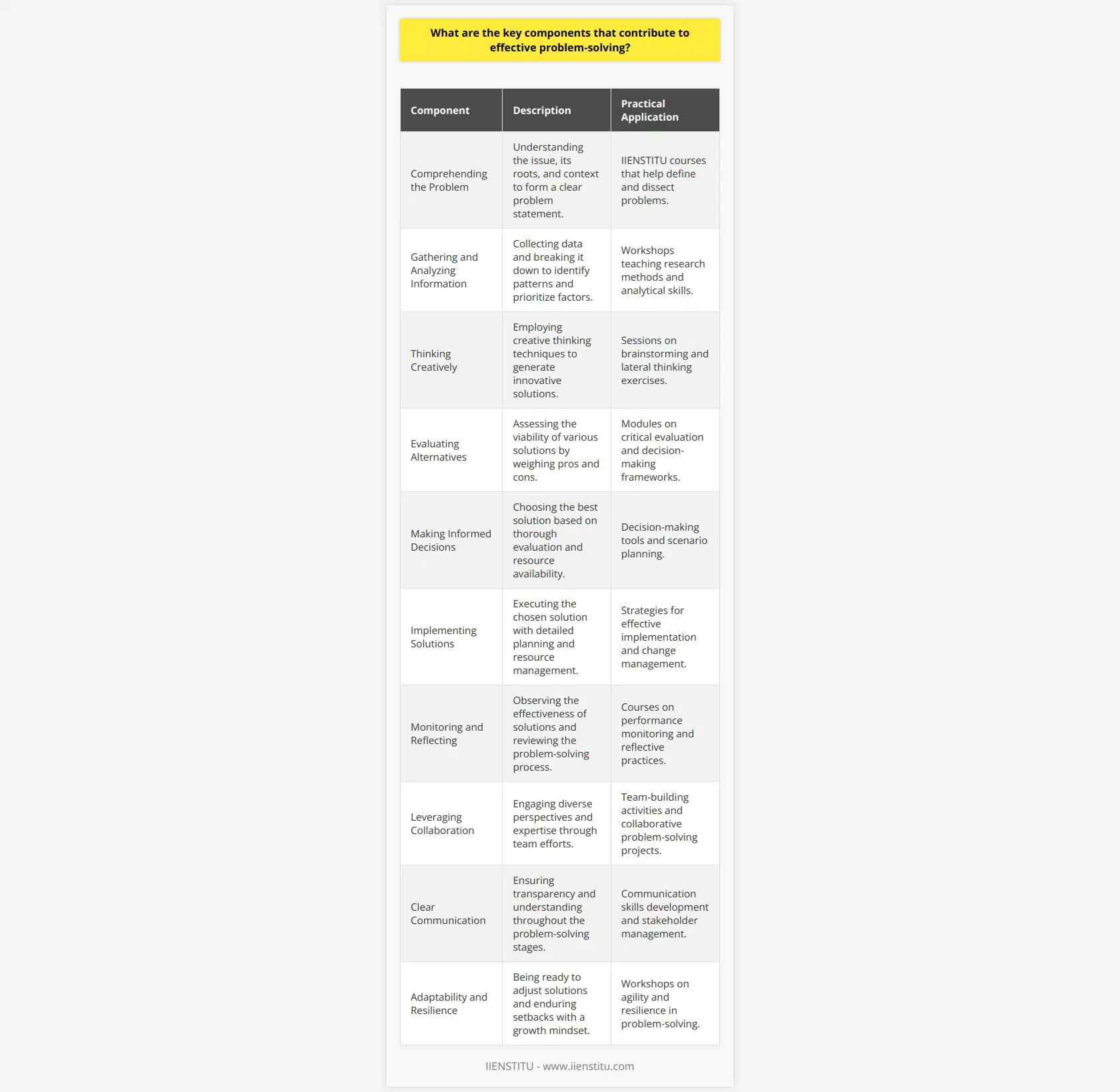
How can cultivating a positive attitude improve the overall problem-solving process?
Significance of a Positive Attitude
Cultivating a positive attitude plays a vital role in enhancing the problem-solving process by fostering creativity and increasing motivation to succeed. When an individual approaches a problem with a positive mindset, they are more likely to engage in divergent thinking, where multiple solutions are explored to reach an optimal outcome (Isen, 2009). This perspective enables them to consider various alternative paths, leading to increased adaptability and a more manageable pathway towards resolution.
Impact on Cognitive Abilities
A positive attitude also enhances cognitive abilities, allowing individuals to effectively process information, identify patterns, and make logical connections (Fredrickson, 2004). By focusing on the potential for success, the brain can more efficiently organize and analyze relevant data, improving the quality of the decision-making process. Furthermore, optimism bolsters resilience and persistence, as individuals are more likely to view setbacks as temporary obstacles rather than insurmountable barriers (Seligman, 2006).
Collaboration and Conflict Resolution
Positive attitude extends beyond personal cognitive benefits and has the potential to improve group dynamics when solving complex problems collectively. By promoting a constructive environment, individuals are encouraged to share ideas, learn from others, and support their peers in formulating creative solutions (Amabile, 1996). Moreover, a positive attitude facilitates effective conflict resolution, as individuals are more predisposed to understand alternative viewpoints and collaborate to achieve mutually beneficial outcomes (Deutsch, 2000).
Conclusion
In conclusion, cultivating a positive attitude yields numerous benefits for the overall problem-solving process. By stimulating divergent thinking, enhancing cognitive abilities, and fostering effective collaboration among team members, individuals with a positive mindset can overcome challenges and develop innovative solutions. Therefore, embracing optimism and resilience significantly improves not only one’s personal problem-solving skills but also fosters a supportive environment where the collective intelligence thrives.
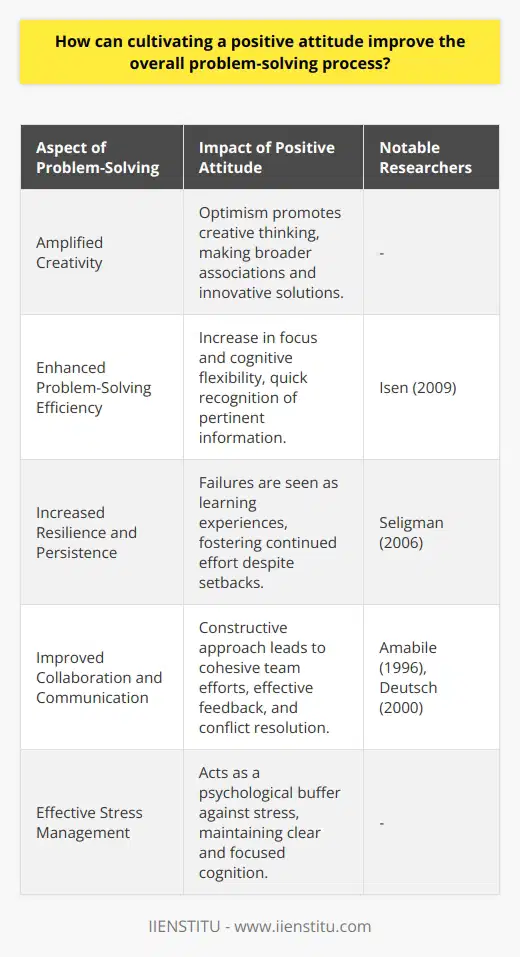
What are some practical strategies that can be employed to maintain a positive attitude while tackling complex problems?
Practical strategies for maintaining a positive attitude
Cultivating a growth mindset
One practical strategy for maintaining a positive attitude while tackling complex problems is cultivating a growth mindset. This involves embracing challenges, viewing failures as opportunities to learn and persisting in the face of obstacles.
Setting smaller, achievable goals
Another strategy is setting smaller, achievable goals. Breaking the complex problem down into manageable tasks helps make it less daunting and encourages progress. Completion of each smaller task provides a sense of accomplishment, motivating continued efforts.
Adopting effective time management
Implementing effective time management not only improves efficiency but also reduces stress. Prioritising tasks, setting realistic deadlines and incorporating breaks into the schedule ensures steady progress and protects against burnout.
Emphasising mental and physical well-being
Maintaining mental and physical well-being is crucial for sustaining a positive attitude. Prioritising sleep, nutrition, exercise and relaxation promotes a healthy mindset, better focus and increased resilience when faced with difficult problems.
Surrounding oneself with positivity
Our social environment can significantly impact our attitude. Surrounding oneself with positive, supportive and like-minded individuals helps create an uplifting environment conducive to problem-solving.
Practicing self-compassion
Recognising that everyone experiences occasional setbacks is essential for maintaining a positive attitude. Instead of being self-critical, practice self-compassion, accepting the present circumstances and focusing on what can be controlled and improved.
Using positive affirmations
Positive affirmations are statements that promote a positive mindset and stress resilience. Repeating these affirmations throughout the day can help boost self-esteem, motivation and overall attitude.
Seeking external resources
Lastly, seeking external resources like books, articles, online courses or even consulting with experts can provide valuable insights and tools for solving complex problems. These resources augment understanding and foster a sense of empowerment.
In conclusion, incorporating various practical strategies such as cultivating a growth mindset, setting smaller goals, managing time effectively, prioritising well-being, surrounding oneself with positivity, practicing self-compassion, using positive affirmations and seeking external resources can help maintain a positive attitude while tackling complex problems. These approaches not only facilitate problem-solving but also improve overall resilience and well-being.
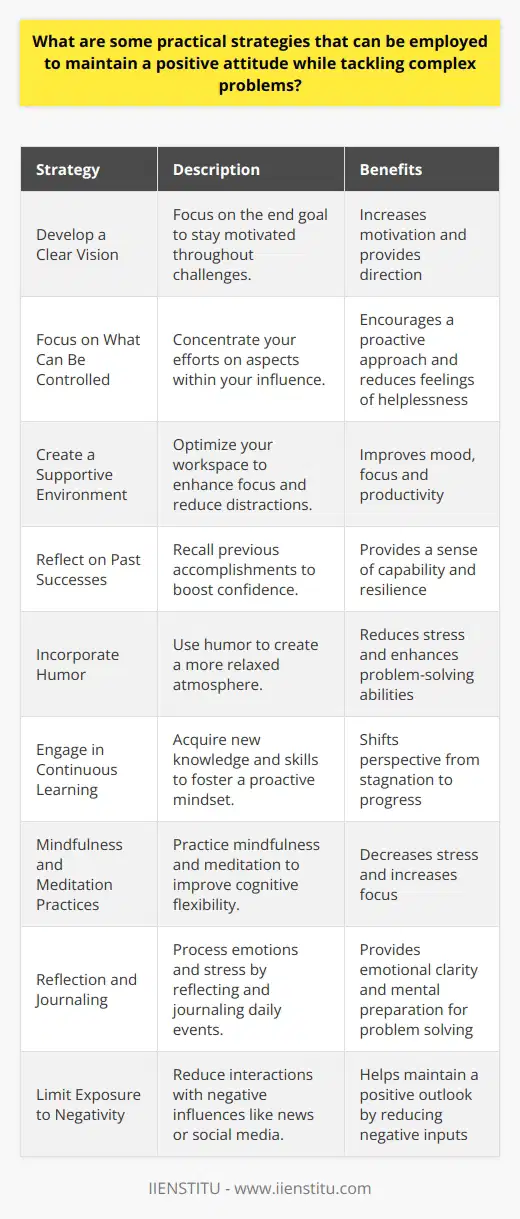
What are the factors that contribute to developing and maintaining a positive attitude during problem-solving?
Factors Influencing Positive Attitude Development
Various factors contribute to developing and maintaining a positive attitude during problem-solving, which can enhance an individual's overall performance and success in finding effective solutions. These factors include cognitive, emotional, social, and environmental aspects.
Cognitive Factors
The cognitive factors involve an individual's inherent beliefs, perceptions, and thought patterns. A growth mindset, which embraces challenges and views effort as a pathway to improvement, is critical for fostering a positive attitude during problem-solving. Additionally, self-efficacy, or the belief in one's ability to achieve a desired outcome, can boost problem-solving efficiency and facilitate a positive attitude.
Emotional Factors
Positive emotions, like optimism and hope, play a vital role in maintaining a positive attitude during problem-solving. Optimism fosters resilience and encourages an individual to face challenges with a constructive approach. Further, hope promotes goal-directed thinking, adaptive coping strategies, and heightened motivation, which influence one's problem-solving attitude positively.
Social Factors
The social environment, including the presence of supportive peers, mentors, or supervisors, can contribute to a positive attitude development during problem-solving. Individuals in encouraging social contexts are more likely to feel confident and motivated to tackle challenges. Collaboration and teamwork can also facilitate diverse perspectives and creative solutions, promoting a constructive problem-solving attitude.
Environmental Factors
Lastly, the physical environment can impact an individual's attitude while addressing problems. A comfortable, organized, and functional workspace can foster focus, productivity, and a positive attitude. Additionally, implementing stress-relief techniques, such as regular breaks and stress-relieving activities, can foster a relaxed state of mind, essential for problem-solving.
In conclusion, developing and maintaining a positive attitude during problem-solving involves a holistic approach that takes into account cognitive, emotional, social, and environmental factors. Cultivating a growth mindset, nurturing positive emotions, fostering supportive social connections, and optimizing the physical environment can significantly enhance an individual's problem-solving attitude and performance.
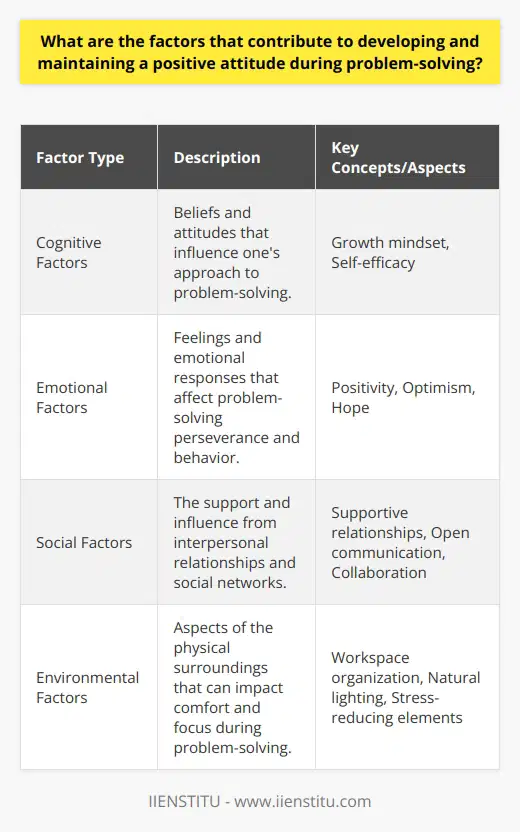
How do positive attitudes in problem-solving influence group dynamics and collaboration?
Impact on Group Dynamics
Positive attitudes in problem-solving significantly affect group dynamics by fostering healthy communication channels, active participation, and commitment. With a solution-oriented mindset, group members tend to focus more on finding common ground, thereby minimizing conflicts and misunderstandings. As individuals distinctly acknowledge the potential of diverse perspectives in the resolution of complex tasks, they adopt a proactive approach to engaging with others.
Enhancing Collaboration
In addition, a positive problem-solving atmosphere promotes a sense of shared responsibility among group members. This feeling of connectedness paves the way for smooth collaboration, allowing individuals to leverage their strengths in achieving a shared objective. When group members support one another in overcoming challenges, they build trust and strengthen their interdependence, which is crucial for promoting a cohesive team culture.
Promoting Creativity and Innovation
Moreover, positive attitudes in problem-solving stimulate creativity and innovation within groups, as participants feel more comfortable sharing their ideas and thinking outside the box. By fostering an environment that celebrates diverse thinking and encourages open discussions, groups harness a wealth of knowledge that ultimately leads to the generation of novel solutions to complex issues.
Encouraging Adaptability
Furthermore, groups with a positive problem-solving outlook demonstrate high adaptability and resilience when encountering unexpected obstacles or setbacks. By focusing on solutions rather than dwelling on failure, members develop a sense of empowerment and determination. This, in turn, increases the group's overall capacity to develop and implement effective strategies that address the task at hand.
Conclusion
In summary, positive attitudes in problem-solving significantly influence group dynamics and collaboration by facilitating effective communication, fostering collective responsibility, stimulating creativity, and promoting adaptability. By cultivating a constructive and solution-oriented environment, groups can enhance their overall effectiveness and maximize their potential in achieving desired outcomes.
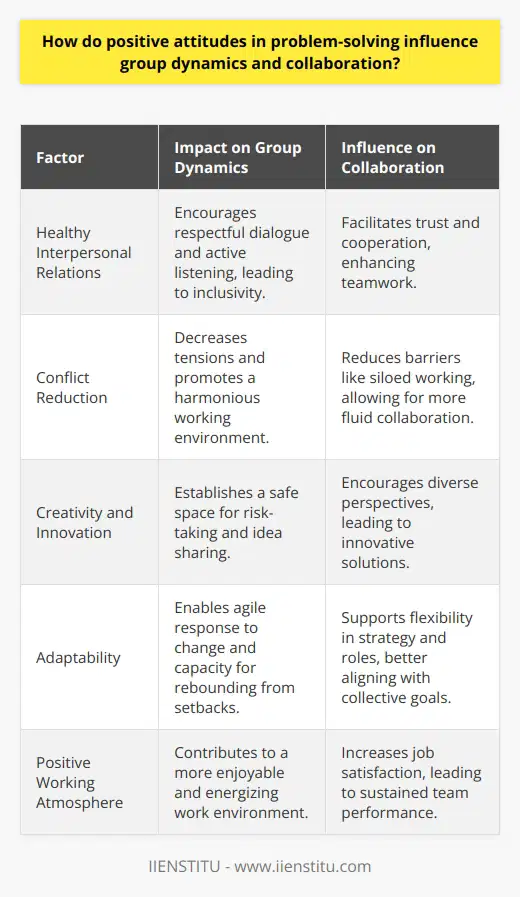
In what ways can fostering a positive attitude in problem-solving enhance creativity and innovation?
The Impact of a Positive Attitude
Fostering a positive attitude in problem-solving significantly influences creativity and innovation within individuals and organizations. A positive mindset toward problem-solving allows the individual to explore more possibilities, yielding dynamic approaches for resolving issues.
The Role of Cognitive Flexibility
One crucial aspect of this influence is cognitive flexibility, which is the ability to think about a problem from multiple perspectives and generate diverse ideas. A positive attitude improves cognitive flexibility by encouraging individuals to focus on the potential benefits of generating innovative solutions, rather than dwelling on the difficulties faced in arriving at those solutions. This shift in focus enhances creative thinking by expanding the range of ideas and perspectives explored.
Encouragement of Collaboration
Additionally, a positive attitude promotes collaboration and knowledge sharing among team members, fostering a synergistic environment that supports idea generation and innovation. When individuals approach problem-solving with optimism, they are more open to hearing and learning from others' perspectives, facilitating the exchange of valuable insights and ideas.
Embracing Risk-taking and Uncertainty
Furthermore, a positive mindset empowers individuals to embrace risks and uncertainties associated with innovative problem-solving. By considering setbacks and failures as opportunities for learning and improvement, individuals can develop resilience and adaptability, vital traits for creativity and innovation. A positive attitude toward problem-solving encourages experimentation and learning, cultivating a growth mindset that fuels innovation.
Enhanced Motivation and Persistence
Finally, a positive attitude bolsters motivation and persistence in the face of challenging problems. When individuals believe in their ability to find solutions and the potential value of their ideas, they become more passionate about the problem-solving process. They are more likely to continue exploring and refining ideas, resulting in an increase in creative output and the development of innovative solutions.
In conclusion, fostering a positive attitude in problem-solving can greatly enhance creativity and innovation by supporting cognitive flexibility, encouraging collaboration, embracing risk-taking and uncertainty, and bolstering motivation and persistence. Therefore, individuals and organizations should invest in cultivating a positive outlook for improved problem-solving outcomes, driving overall success.
